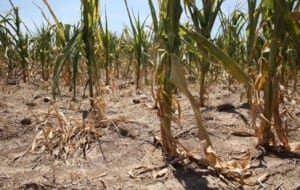California drought may be linked to climate change
October 3, 2014Study from Stanford University shows that severe drought could be connected to climate change
A recent study released by Stanford University, commissioned by the National Science Foundation, suggests that the ongoing drought that has struck California is linked to climate change. Over the past four years, the state has been wrestling with a severe drought that has caused serious problems in its energy structure. This drought has been one of the most catastrophic events of its kind for the state, and it may be due to human-driven climate change.
Storms are not reaching California
The study found a persistent region of high atmospheric pressure over the Pacific Ocean. This has diverted storms that were on their way to California. The study suggests that storms would become increasingly common due to the concentration of greenhouse gases, but certain atmospheric phenomena have prevented this from happening. With only modest storms coming to the state, drought has managed to establish a strong foothold.
High temperatures and poor air conditions are creating serious problems throughout the state
 The drought has been made stronger by unusually warm temperatures and stagnant air conditions throughout the state. The severe lack of precipitation has also created dangerous conditions where wildfires could become quite common. Severe air pollution has also been recorded throughout, which could eventually lead to serious health issues for residents of large cities.
The drought has been made stronger by unusually warm temperatures and stagnant air conditions throughout the state. The severe lack of precipitation has also created dangerous conditions where wildfires could become quite common. Severe air pollution has also been recorded throughout, which could eventually lead to serious health issues for residents of large cities.
Ongoing drought continues to have an effect on the state’s energy capabilities
The drought has also taken a toll on the state’s ability to produce energy. Much of the state’s electrical power is derived from fossil-fuels, but oil and coal do not generate energy on their own. These fuels are used to boil water, creating steam. The steam is fed through turbines that generate electricity. The state also has several hydropower systems that it relies on for electricity. These energy systems have been impacted by the drought, which has reduced their access to water resources. The drought has succeeded in encouraging the state to focus more heavily on renewable energy, which may be a silver lining in an otherwise catastrophic problem.

 HFN News is your leading source for fresh hydrogen and renewable energy updates. Amid the fast-paced growth of hydrogen companies, we provide top-notch news and insights about this exciting sector. Our coverage spans from hydrogen cars to global sustainable initiatives, and we highlight the latest in green jobs and developing hydrogen hubs. We invite you to share your local hydrogen news and explore today’s renewable energy job listings on our site. Thanks for choosing HFN News as your trusted guide to the hydrogen and renewable energy world!
HFN News is your leading source for fresh hydrogen and renewable energy updates. Amid the fast-paced growth of hydrogen companies, we provide top-notch news and insights about this exciting sector. Our coverage spans from hydrogen cars to global sustainable initiatives, and we highlight the latest in green jobs and developing hydrogen hubs. We invite you to share your local hydrogen news and explore today’s renewable energy job listings on our site. Thanks for choosing HFN News as your trusted guide to the hydrogen and renewable energy world!